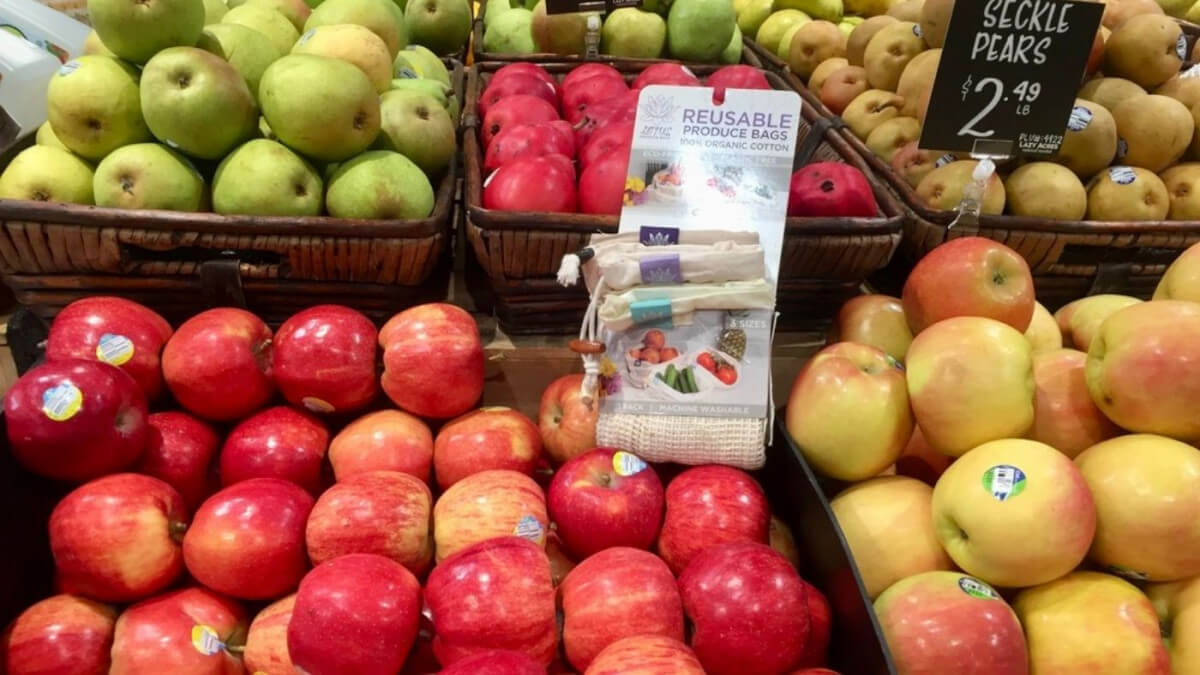It’s a crisp Fall day. You’re wearing your favorite jeans, a cozy flannel shirt, and fuzzy boots. You look effortlessly chic. With an empty coffee tumbler in one hand and your car keys in the other, you swing your rolled-up Lotus Trolley Bag over your shoulder and head out the door.
First stop, the local coffee shop. #priorities
“One pumpkin spice latte, please,” you say, handing your tumbler to the barista who fills it to the top. (Who needs room for cream and sugar when there’s pumpkin spice involved?!)
Back in your car, you sit for a minute, invigorated by the autumnal aroma. A few sips later, you’re ready to roll. On to your main event, grocery shopping!
You arrive at the grocery store and claim a cart. Then, you proudly unfold your Lotus Trolley Bag and spread it out, tucking in the handles so it looks as pretty as possible.
When the automatic doors glide open, you’re welcomed by a display of mini pumpkins and mini, candy bars. “For the kids,” you lie to yourself as you throw a mixed bag of fun-sized Hershey’s chocolate into your LTB.
“Ok, no more junk.” You say to yourself as you take a sip of your latte to regain focus.
When you steer your cart to the produce aisle, you take a moment to express gratitude for the abundance of seasonal fruits and vegetables. Then you whip out your Lotus Produce Bags and start shoppin’.
As you bag some brussel sprouts, you have a thought, What is the best way to store brussel sprouts?!
Don’t worry, beautiful shopper! We’re here to help. Today, we are talking about some of our favorite fall produce.
Here are our Top 5 Fall Produce Faves for 2020
Apples
Why we love apples
We’ve all been told that an apple a day keeps the doctor away. That’s because apples are packed with juicy nutrients that keep our bodies healthy and strong, including vitamin C, vitamin A, and vitamin E. Apples also have a high fiber content, making them a filling and satisfying snack (unlike potato chips). Gain the most health benefits by consuming the entire apple, skin too! Or satisfy your sweet tooth with homemade applesauce or apple pie.
How to keep apples fresh
Fresh apples are crisp apples. So it makes sense to keep your apples in the crisper! Apples like cold temperatures (30-35 degrees fahrenheit), so when apples are in the house, keep your refrigerator as low as possible without causing other items to freeze. When stored in a refrigerator crisper, apples can stay fresh for several weeks.
Unfortunately, apples do not play nice with other fruits and vegetables. They give off ethylene, which causes other produce to spoil faster. (Maybe that’s why refrigerators have more than one crisper! One for your apples and one for everything else.)
Carrots
Why we love carrots
They say a healthy diet is a colorful diet. So let’s add some beautiful orange into our fall produce mix! Orange carrots get their bright color from beta carotene, an antioxidant that your body converts into vitamin A. Carrots are also known for containing vitamins and minerals that help reduce the risk of cancer and maintain eye health.
One of our favorite things about carrots is that they can be enjoyed raw or cooked. Dip in a flavorful hummus and enjoy. Or simmer into the broth of your favorite chicken soup. However you choose to consume your carrots, know that you’re making a healthy choice.
How to keep carrots fresh
Fresh carrots are all about that crunch. Is there anything less satisfying than a limp, wilted carrot?! (Ok, maybe. But that’s besides the point.)
To keep your carrots fresher longer, we recommend storing them in water. Place your carrots (baby or regular-sized) in a casserole dish or glass jar. Then add filtered water, just enough to submerge the carrots. Place the carrots on a shelf in your refrigerator. No need to cover. Strain and add fresh water every few days or when the water appears murky. Refrigerated carrots stored in water can stay fresh for 2-5 weeks!
Brussel Sprouts
Why we love brussel sprouts
Rich in antioxidants and vitamin C, brussel sprouts are a great way to power up your immune system as we head into the colder months. Brussels sprouts are also high in fiber, helping you to maintain blood sugar and digestive health. More health benefits include vitamin K and anti-inflammatory properties. Plus, brussel sprouts are delicious! Try them roasted or as part of a hearty fall soup.
How to keep brussel sprouts fresh
Other sites will tell you that the best way to keep brussel sprouts fresh is by storing them in a plastic bag. But as part of the Lotus Sustainables community, you already know that storing your produce in plastic actually suffocates fruits and veggies, causing them to rot and grow slimy way too quickly. Plus, plastic bags leach BPA poisons into our food! Surely brussel sprouts taste better poison-free.
We recommend storing your fresh brussels in a Lotus Produce Bag! If you brought your Lotus Produce Bag to the grocery store, simply place the entire bag in your non-apple crisper. When stored in a Lotus Produce Bag and placed in a crisper without apples, brussel sprouts will stay fresh 1-3 weeks.
Pears
Why we love pears
Sweet, juicy pears are a nutritious addition to any diet. The vitamin C in pears fight off free radicals, reducing risk of cancer, diabetes, heart disease, and even neurodegenerative diseases like dementia.
High in fiber and low in sugar, pears satisfy our sweet tooth and keep our bellies full to prevent the dreaded blood sugar crash. Add a healthy burst of flavor to your fall salads with slices of fresh pear. Or prepare a (not too) sweet dessert.
How to keep pears fresh
Unlike apples, pears are usually not ready-to-eat when we buy them in the store. Oftentimes, they need a few more days to ripen before they deliver that sweet nectar flavor. Pears should be stored at room temperature. They usually require between 2 and 7 days to ripen. Sometimes placing pears inside a paper bag can help to speed up the ripening process.
How do you know if a pear is ripe? Lightly press on the neck of the pear, right below the stem. If the pear gives to your touch, it is ready to enjoy! Ripe pears stored at room temperature can stay fresh for 2-4 days. To prevent overripening, place ripe pears in the refrigerator. Remember to keep your pears away from apples to protect them from the ethylene gases.
Butternut Squash
Why we love butternut squash
Butternut squash, or winter squash, is rich in important vitamins, minerals, and disease-fighting antioxidants. In fact, butternut squash contains more vitamins and minerals than any other fall produce on this list!
One of the most abundant nutrients in butternut squash is vitamin A. Vitamin A is essential for regulating cell growth, eye health, bone health, and immune function. This fall favorite is also high in magnesium, potassium, and manganese, all of which play important roles in bone health.
We could go on and on about the health benefits of butternut squash, but we’d rather jump to some delicious ways to incorporate winter squash into our fall diet. Try replacing carb-loaded spaghetti with butternut squash noodles. Or crafting a hearty, healthy fall salad.
How to keep butternut squash fresh
At the store, you’ll know that a squash is fresh if it seems heavy for its size. When selecting your squash, make sure it does not have any bruises or soft spots.
Store butternut squash in a cool, dark place, away from sunlight to prevent overripening. Butternut squash can be large, sometimes one squash is more than we need at one time. Cut leftover squash into smaller pieces and store in the refrigerator to use within 2-5 days.













